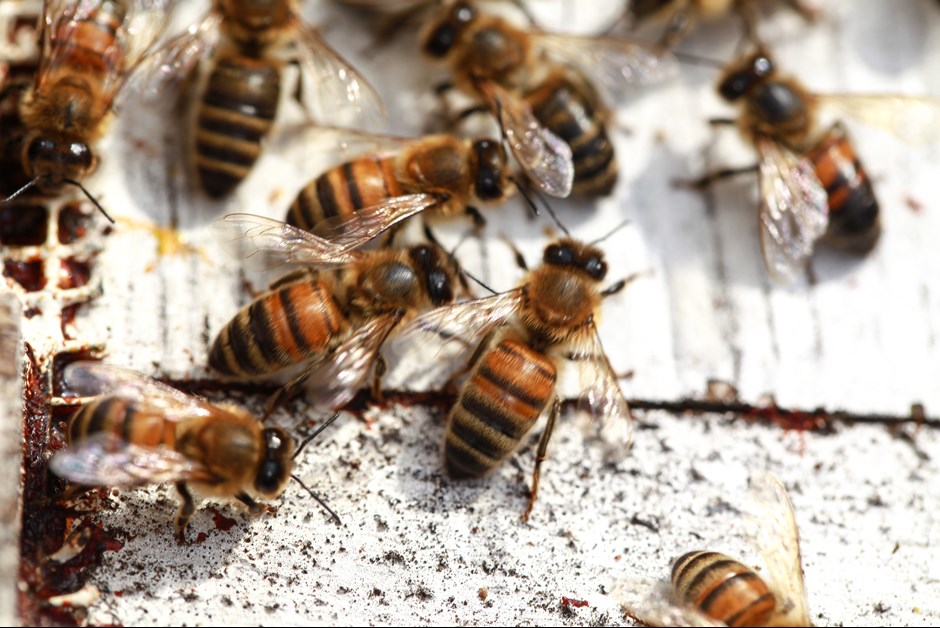EVEN BEES NEED THEIR ZZZZs - THE BUZZ ON FAIRMONT BEES WITH BEE BUTLER MICHAEL KING (JULY 2016)
Ever wondered if bees sleep ? Wonder no more because the evidence from scientific study and research into the life of bees shows that they sleep between 5 – 8 hours a day. People tend to regard sleep as a nuisance that gets in the way of life but think again and you will see that sleep is critical to our success and our sanity. That is true even for the honey bee and other bees also. It is especially critical to social bees and here is why.
A worker bee lives on average 28-35 days and it has to pack in a lot of work in that short lifespan. It has to be a nurse bee, build honeycomb, clean the cells, feed the queen, fee the young eggs and larva, it then has to an undertaker and take out dead or dying or infected bees or larva, it has to guard the entrance of the hive against predators and finally in the last 2 or 3 weeks of it’s life it has to take flight outside the hive and collect food sources for the hive to feed on and survive, flying up to 5 kilometers from the hive in search of food.
If a bee is robbed of sleep or through circumstances prevented from getting adequate sleep the bee is affected in a number of ways. Firstly it begins to lose it’s ability to accurately communicate through it’s elaborate ‘bee dance’ when returning from a flight out to collect pollen and nectar. Lack of sleep gets in the way of the bees memory recall and it either provides incomplete information to it’s fellow worker bees about where food sources lie, or it simply cannot recall critical pieces of it’s travel itinerary, like correct distance to the food source, or exact co-ordinates to help guide the bees to their intended destination. If it gets too little sleep it may actually fail to remember how it finds it’s way home and never make the trip back to the hive. Lack of sleep will make the bee more susceptible to illness and disease as it’s immunity will be compromised because it doesn’t get to re-energize itself for the next days activities!
Bees sleep predominantly in the darkness of overnight hours but they also take mini sleeps in the daytime and will take turns allowing numbers of bees to catch their ’40 winks’ before returning to the job of being a worker bee.
Do you see the connection between the impact on a bee and the impact on people from lack of sleep ? Lack of effective immune systems, lessened ability to communicate effectively, lessened memory recall and general worsening efficiency as an individual within a social setting.
When a bee sleeps it simply goes inert, relaxes it’s legs and appears to drop slowly to the surface it is clinging to so that it’s head is laying against the frame. In some cases when sleeping they have been seen to literally fall over to one side as they relax into a deep slumber !
A bee may well even dream and what do you think it dreams of ?! It seems that it recalls the smells and colours of flowers from scientific tests that show when a bee is sleeping if a smell is introduced to the sleeping bee from a few millimeters away from it , it sticks it’s long tongue out as if to have a ‘virtual’ taste of the nectar while it is dreaming. It seems that when a bee dreams it is reminding itself of the smells and the flowers that it is attracted to and will then awake ready to seek out those very same flowers and smells when it flies from the hive.
What’s the message in all of this ? Sleep is much more than a waste of one third of a day. It is way to provide the body with almost magical powers of healing, regeneration, rejuvenation and replenishing and rebalancing of our bodies cells and our immune systems. So sleep, perchance to dream but perhaps not of flying around flowers, unless of course you’re a bee !!
Learn more about our bees at: Fairmont Waterfront Green Hotel Initiatives
For more #BeeButler posts visit: Fairmont Buzz on Bees
#FairmontBuzz #BuzzOnBees #BeeButler #BeeSustainable
